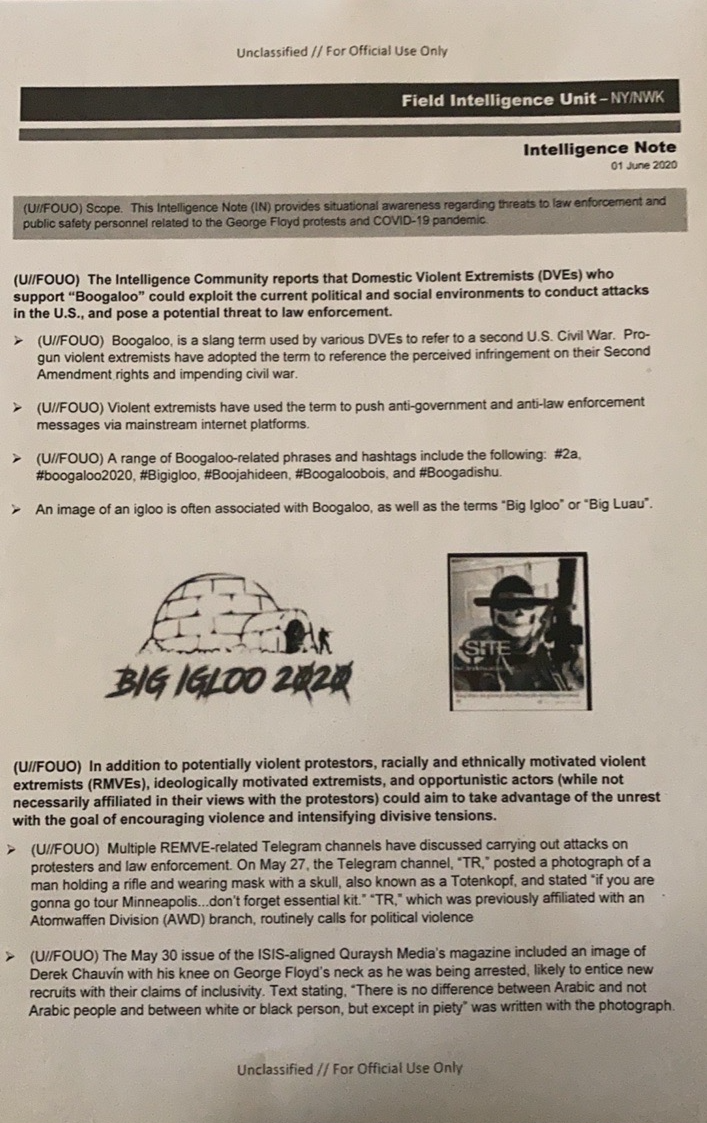The US Intelligence Community, the consortium of spy agencies you most often hear about in the context of things like Russian espionage or Chinese cyberattacks, has a new target: the Boogaloo movement.
Widely known for their provocative memes and penchant for Hawaiian shirts paired with military fatigues, Boogaloos are a loosely affiliated coalition of far-right anti-government groups who aim to prepare for—or even instigate—a second American civil war. Their love of guns and zealous opposition to government allegedly resulted last month in the murder of two security guards and a police officer. This prompted Attorney General William Barr to announce the formation of a task force to investigate the group.
Last month, the Department of Homeland Security (DHS) published a report obtained by The Nation, which begins by stating, “The Intelligence Community reports that Domestic Violent Extremists (DVEs) who support ‘Boogaloo’ could exploit the current political and social environments to conduct attacks in the United States, and pose a potential threat to law enforcement.”
The intelligence report, dated June 1, 2020, and marked “For Official Use Only,” was provided by a federal law enforcement official on condition of anonymity to avoid professional reprisal. The DHS did not respond to a request for comment.
The Boogaloo movement has been implicated in a string of horrific murders in the past several months, so it’s not surprising that federal agencies would be monitoring them. The report does not disclose which agencies produced the intelligence, but the Intelligence Community isn’t a typical organization—it includes within it top-tier intelligence bodies like the CIA, the NSA, and the FBI.
These agencies are often tasked with spying on nation-state adversaries as well as countering their respective intelligence services. Many employees possess top secret security clearances and access to such sensitive information that they are routinely given polygraph tests to ensure that they haven’t disclosed secrets without authorization. That the Intelligence Community is monitoring the Boogaloo movement speaks to the seriousness of the threat.
In June, Steven Carrillo, an active duty US Air Force sergeant who had served as a team leader in the Air Force’s elite Phoenix Raven security unit, allegedly used a silenced machine gun and pipe bombs to kill one police officer and two Federal Protective Service security guards. Several other police officers were also injured. Carrillo, who is alleged to have worked with another Boogaloo accomplice, reportedly scrawled in blood the word “boog” on his car along with a phrase popular among Boogaloo members: “I became unreasonable.”
As a consequence of the violence, the Defense Department has been quietly debating how to better monitor military personnel for signs of extremism, according to a senior department official who was not authorized to speak publicly. Many among the department’s leadership believe that simply monitoring personnel’s social media accounts would be effective, but privacy rules often prevent them from doing so, the official explained.
Asked if the Pentagon has updated its policies for detecting violent extremists in its ranks, a Defense Department spokesman cited its Insider Threat Management and Analysis Center, saying, “Individuals expressing affiliation, allegiance or ideological symmetry to an organization associated with extremism (including white supremacism, neo-Nazism, terrorism, or gang association) could qualify as demonstrating a concerning behavior(s) under the DoD’s insider threat program.” Forty other Pentagon subdivisions have their own additional insider threat programs, the spokesman added.
Despite this, as my senior Defense Department source explained, the Pentagon’s capabilities remain inadequate to the threat posed by domestic extremists, which he believes is rapidly evolving. In fact, none of the policies that the spokesman mentioned appeared to be new, though he didn’t mention the internal debate about updating the program.
Still, that the Pentagon is even debating a response to the wave of far-right violence may represent an inflection point for an administration that has often appeared reluctant to address the threat. While President Trump has repeatedly inveighed against “the radical left,” including antifa, which he vowed to label a terrorist organization, he has yet to address the Boogaloo attack, as well as others carried out by individuals motivated by far-right ideologies.
As one former senior counterterrorism official told me, “It’s pretty clear that as long as Trump’s in office, homegrown violent extremism isn’t going to be a priority. He’s more concerned about an immigrant who overstayed his visa.”



